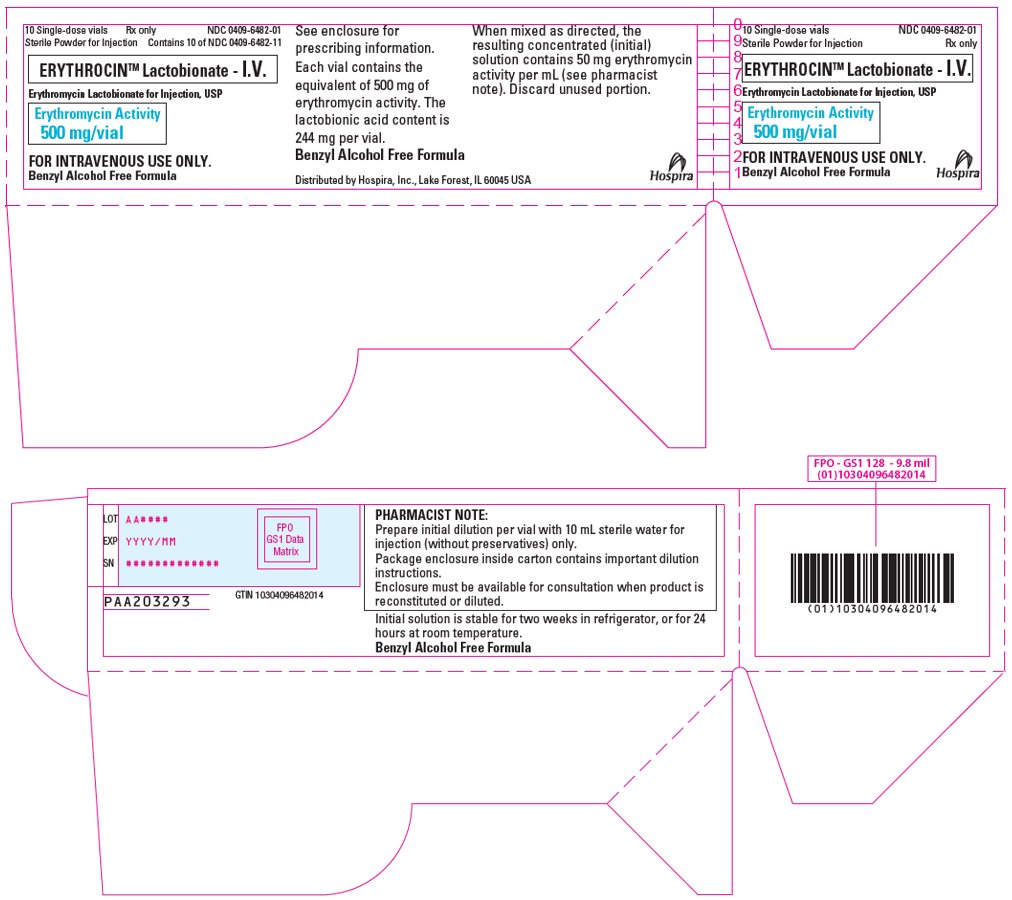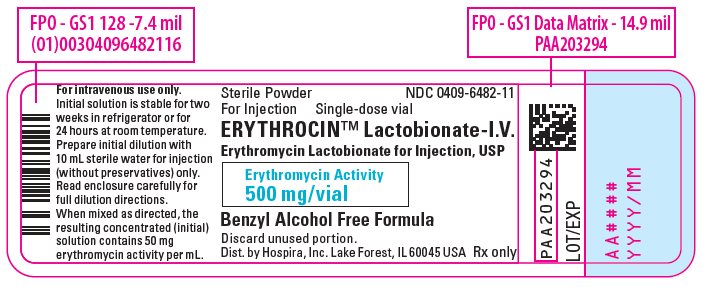Modern medicine has evolved so much so that sooner or later every breastfeeding mother needs to take it in one form or other. Medication that is present in mothers blood will transfer into her breast milk to some extent. Most drugs do so at low levels and pose no real risk to infants but then there are some exceptions. In This post will discuss whether Erythrocin Lactobionate | Erythromycin Lactobionate Injection, Powder, Lyophilized, For Solution is safe in breast-feeding or not.
What is Erythrocin Lactobionate | Erythromycin Lactobionate Injection, Powder, Lyophilized, For Solution ?
Erythrocin Lactobionate-IV (erythromycin lactobionate for injection, USP) is indicated in the treatment of infections caused by susceptible strains of the designated organisms in the diseases listed below when oral administration is not possible or when the severity of the infection requires immediate high serum levels of erythromycin. Intravenous therapy should be replaced by oral administration at the appropriate time. Upper respiratory tract infections of mild to moderate degree caused by Streptococcus pyogenes (Group A beta-hemolytic streptococci); Streptococcus pneumoniae (Diplococcus pneumoniae); Haemophilus influenzae (when used concomitantly with adequate doses of sulfonamides, since many strains of H. influenzae are not susceptible to the erythromycin concentrations ordinarily achieved). (See appropriate sulfonamide labeling for prescribing information.) Lower respiratory tract infections of mild to moderate severity caused by Streptococcus pyogenes (Group A beta-hemolytic streptococci); Streptococcus pneumoniae (Diplococcus pneumoniae). Respiratory tract infections due to Mycoplasma pneumoniae . Skin and skin structure infections of mild to moderate severity caused by Streptococcus pyogenes and Staphylococcus aureus (resistant staphylococci may emerge during treatment). Diphtheria: As an adjunct to antitoxin infections due to Corynebacterium diphtheriae to prevent establishment of carriers and to eradicate the organism in carriers. Erythrasma: In the treatment of infections due to Corynebacterium minutissimum . Acute pelvic inflammatory disease caused by Neisseria gonorrhoeae : Erythrocin Lactobionate-IV (erythromycin lactobionate for injection, USP) followed by erythromycin stearate or erythromycin base orally, as an alternative drug in treatment of acute pelvic inflammatory disease caused by N. gonorrhoeae in female patients with a history of sensitivity to penicillin. Before treatment of gonorrhea, patients who are suspected of also having syphilis should have a microscopic examination for T. pallidum (by immunofluorescence or darkfield) before receiving erythromycin and monthly serologic tests for a minimum of 4 months thereafter. Legionnaires' Disease caused by Legionella pneumophila . Although no controlled clinical efficacy studies have been conducted, in vitro and limited preliminary clinical data suggest that erythromycin may be effective in treating Legionnaires' Disease. Prevention of Initial Attacks of Rheumatic Fever Penicillin is considered by the American Heart Association to be the drug of choice in the prevention of initial attacks of rheumatic fever (treatment of Group A beta-hemolytic streptococcal infections of the upper respiratory tract e.g., tonsillitis, or pharyngitis).1 Erythromycin is indicated for the treatment of penicillin-allergic patients. The therapeutic dose should be administered for ten days. Prevention of Recurrent Attacks of Rheumatic Fever Penicillin or sulfonamides are considered by the American Heart Association to be the drugs of choice in the prevention of recurrent attacks of rheumatic fever. In patients who are allergic to penicillin and sulfonamides, oral erythromycin is recommended by the American Heart Association in the long-term prophylaxis of streptococcal pharyngitis (for the prevention of recurrent attacks of rheumatic fever).1 Prevention of Bacterial Endocarditis Although no controlled clinical efficacy trials have been conducted, oral erythromycin has been recommended by the American Heart Association for prevention of bacterial endocarditis in penicillin-allergic patients with prosthetic cardiac valves, most congenital cardiac malformations, surgically constructed systemic pulmonary shunts, rheumatic or other acquired valvular dysfunction, idiopathic hypertrophic subaortic stenosis (IHSS), previous history of bacterial endocarditis and mitral valve prolapse with insufficiency when they undergo dental procedures and surgical procedures of the upper respiratory tract.2 To reduce the development of drug-resistant bacteria and maintain the effectiveness of erythromycin and other antibacterial drugs, erythromycin should be used only to treat or prevent infections that are proven or strongly suspected to be caused by susceptible bacteria. When culture and susceptibility information are available, they should be considered in selecting or modifying antibacterial therapy. In the absence of such data, local epidemiology and susceptibility patterns may contribute to the empiric selection of therapy.
Can I use Erythrocin Lactobionate | Erythromycin Lactobionate Injection, Powder, Lyophilized, For Solution while breastfeeding?
Erythromycin is the one and only active ingredient present in Erythrocin Lactobionate | Erythromycin Lactobionate Injection, Powder, Lyophilized, For Solution. Erythromycin in itself is a low risk drug for lactation so it is easy to understand that Erythrocin Lactobionate | Erythromycin Lactobionate Injection, Powder, Lyophilized, For Solution also comes in category of Low Risk item while breastfeeding. Below is the summary of Erythromycin in breastfeeding.
Erythrocin Lactobionate | Erythromycin Lactobionate Injection, Powder, Lyophilized, For Solution Breastfeeding Analsys
Low RiskCAS Number: 114-07-8
Excreted in very low levels into breast milk. Commonly used for pediatric treatment of small babies; it is very well tolerated by infants. Erythromycin is a macrolide that has been related to hypertrophic pyloric stenosis after early exposition through the breast milk. Avoiding its use in the first post-partum month would be a cautious measure. Be aware of the possibility of false negative results of bacterial cultures when the mother is on antibiotics. Also, diarrheal disease due to imbalance of intestinal flora is possible Small doses used for treatment of dermatologic and ophthalmologic conditions, together with a very low level in the mother’s plasma make very unlikely a significant excretion into breast milk. Topically used Erythromycin is safe while breastfeeding. Systemic treatments would be safer after the first month of life. The American Academy of Pediatrics rates it usually compatible with breastfeeding. List of Essential Medicines WHO 2002: Compatible with breastfeeding.
Erythrocin Lactobionate | Erythromycin Lactobionate Injection, Powder, Lyophilized, For Solution Breastfeeding Analsys - 2
CAS Number: 114-07-8

Because of the low levels of erythromycin in breastmilk and safe administration directly to infants, it is acceptable in nursing mothers. The small amounts in milk are unlikely to cause adverse effects in the infant. Monitor the infant for irritability and possible effects on the gastrointestinal flora, such as diarrhea, candidiasis (thrush, diaper rash). One case report and unconfirmed epidemiologic evidence indicates that the risk of hypertrophic pyloric stenosis in infants might occur during maternal use of erythromycin during breastfeeding; however, if it occurs, the frequency is very low. Infant side effects are unlikely with topical application for acne, although topical application to the nipple may increase the risk of diarrhea in the infant. Only water-miscible cream or gel products should be applied to the breast because ointments may expose the infant to high levels of mineral paraffins via licking.[1]
I am nursing mother and I have already used Erythrocin Lactobionate | Erythromycin Lactobionate Injection, Powder, Lyophilized, For Solution, what should I do?
Erythrocin Lactobionate | Erythromycin Lactobionate Injection, Powder, Lyophilized, For Solution is in the category of low risk, if you have already used it then its not a big deal if health and behavior of baby is good. However your health care provider shall be aware of the fact that you have used Erythrocin Lactobionate | Erythromycin Lactobionate Injection, Powder, Lyophilized, For Solution so you should inform him based on your convenience.
My doctor has prescribed me Erythrocin Lactobionate | Erythromycin Lactobionate Injection, Powder, Lyophilized, For Solution, what should I do?
Though Erythrocin Lactobionate | Erythromycin Lactobionate Injection, Powder, Lyophilized, For Solution dose not comes in category of safe drugs rather it comes in category of low risk but if your doctor is aware that you are breastfeeding your baby and has still recommended it then its advantages must be outweighing the risks.
If I am using Erythrocin Lactobionate | Erythromycin Lactobionate Injection, Powder, Lyophilized, For Solution, will my baby need extra monitoring?
Not much monitoring required while using Erythrocin Lactobionate | Erythromycin Lactobionate Injection, Powder, Lyophilized, For Solution
Who can I talk to if I have questions about usage of Erythrocin Lactobionate | Erythromycin Lactobionate Injection, Powder, Lyophilized, For Solution in breastfeeding?
US
National Womens Health and Breastfeeding Helpline: 800-994-9662 (TDD 888-220-5446) 9 a.m. and 6 p.m. ET, Monday through Friday
UK
National Breastfeeding Helpline: 0300-100-0212 9.30am to 9.30pm, daily
Association of Breastfeeding Mothers: 0300-330-5453
La Leche League: 0345-120-2918
The Breastfeeding Network supporter line in Bengali and Sylheti: 0300-456-2421
National Childbirth Trust (NCT): 0300-330-0700
Australia
National Breastfeeding Helpline: 1800-686-268 24 hours a day, 7 days a week
Canada
Telehealth Ontario for breastfeeding: 1-866-797-0000 24 hours a day, 7 days a week
Drug Brands with same Active ingredients



